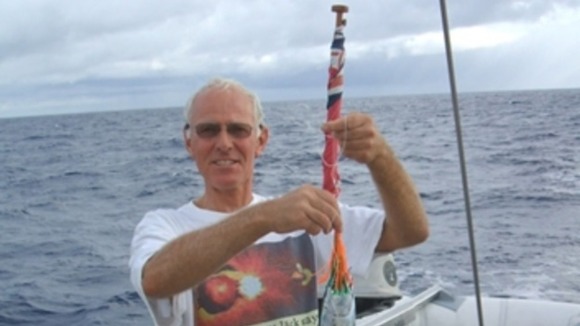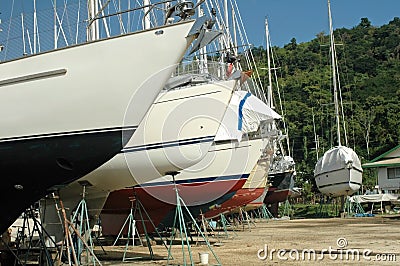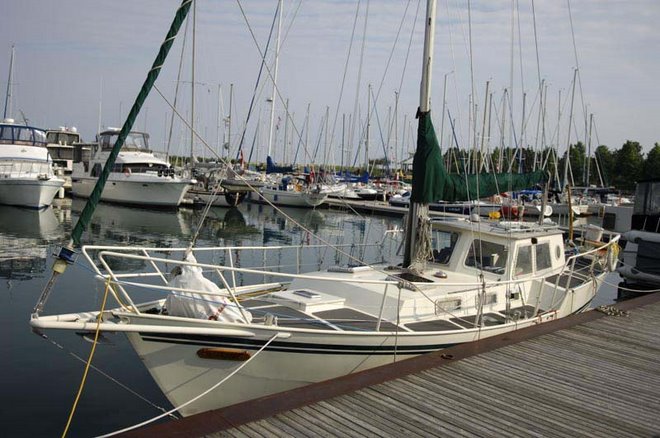 |
| Roger Pratt, whose cruising ended abruptly in St. Lucia. |
Pictured above is Roger Pratt, murdered by vicious thieves in January off the Caribbean island of St. Lucia. The more I read about him and his wife, the more typical a cruising couple they seemed: retired professionals in their early 60s, mucking about at no great rate in the Caribbean. Before the blog of their boat Magnetic Attraction was removed, the Pratts' entries were benign, the record of an engaged couple enjoying the various islands and people they'd visited, and exhibiting a capable degree of seamanship.
Could've been anyone. It's not common to get killed on one's boat, but it's hard to determine if it's getting more common to have that boat robbed. Data is incomplete, or hard to collate, or is stale or anecdotal. I sense that many cruisers are fatalistic on this score, however. Others seem to feel that the onus is on the cruiser to keep alert and to appear, if not poor, than not visibly rich. Don't venture too far. Don't carry money. Dress down, et cetera. And, most importantly, stay informed and keep current about "bad areas" and avoid them. Of course, this doesn't help if a previously good area turns bad because some locals decide to rob your boat, with a little machete work if the owners are aboard and raise objections.
 |
| Frequently seen in groups. |
Of course, nowhere is truly safe and everything is relative. I've been burgled here in Toronto. I've also got into some fairly serious physical altercations, although those are now far in the past. I consider myself reasonably prepared to throw a punch or worse, particularly if my family is also threatened. But I'm no spring chicken anymore, and on passage we would not be, despite bringing our "home" with us, really on home turf.
 |
| You can see the cruise ships from here. Photo (c) Giles Ashford |
Be aware that you are guests and are intrinsically privileged
A sometimes unconsidered fact of life is that when a Westerner affluent enough to have the time and gear necessary to cruise a sailboat shows up in a place where poverty is general; or even a place where the employees of luxury hotels on the beachfront live in shantytowns out of sight behind the property line, it's a sort of taunting. Sometimes, when I am experiencing frustrations with the pace of renovation aboard our yacht, I have to think "if your biggest worry is a unco-operative yacht, you may be approaching one per center territory, Chuckles". Upon such sober reflection, my day tends to improve and the clean drinking water becomes extra-tasty.
Nonetheless, I can never excuse the violence, or the sheer opportunism of seeing a boat as a floating target of looting, but I can sometimes understand how knocking off a cruiser would seem like a good career move to a person with no prospects. And just as clearly, a lot of cash-flush tourists from the rich part of the planet don't appear to comprehend the nature of poverty, to the point where they don't grasp how staying in a fake slum is grossly insulting. Such folk probably see the planet as one big service industry and there's little else to say except they'd better hope that Soylent Green isn't a documentary.
The net effect, however, among the cruising community is to simply cross entire countries or even regions off their "need to visit" lists. In the Caribbean, for instance, cruisers in the planning stages or even actively on passage have nearly instantaneous means of notifying each other, and of keeping a close eye (perhaps a closer eye than the usually lax or underfunded local police) on where the crime is happening.
The effect of crimes against cruisers on local commerce in these places can be immediate and devastating. It can have a big impact on the local politics, as well. Frequently, there is little industry or agricultural production on some islands: tourism, for good or ill, is the lifeblood of the place.
 |
| Stock image of a Trinidad boat yard, a favourite place to haul for its economy and (mostly) hurricane-free climate. |
Yacht tourism, which can involve things like chandleries, provisioners and repair shops, or even full-service boatyards, can provide decent jobs to locals that don't involve wearing little white jackets and handling trays. So there is a dichotomy: on islands where the relationship is understood, thieves can be swiftly caught and (by our First World standards) harshly punished. Other places seem unmotivated to either prevent or to solve crimes, maybe because the poverty is so entrenched.
Take the same precautions as you would at home, because you are at home
We can only make our own choices based on recent information: it's clear that in some cases there's often a spate of robberies done in a semi-organized fashion; other times, a fisherman sees a hatch carelessly left open and decides to improve his material circumstances. In still other cases, boats are robbed while the crew sleeps, and if you've ever slept on a sailboat, that is a pretty amazing level of stealthiness!
We can make our own precautions by sturdy locks, lights and radios left on to suggest occupancy, the retrieving of tenders/dinghies on deck so they can't just be cut free of the boat, and the lifting up and locking of all boarding ladders. This is pretty basic stuff, I think, but you have to go to the people actually living aboard, in this case seasoned co-skippers Ken and Lynn of Silverheels III, to get the real scoop. Others have said much the same thing, but perhaps more holistically: it's been a long time since 'a party line' described a telephone installation, but what is a non-DSC VHF call except an all-points broadcast that is easily overheard? The low acceptance of MMSIs and digital selective calling among cruisers is a mystery to me: if you know you are going to hear from a fellow boater, the VHF will, in effect, "ring" and you can move to a working channel without announcing it on Channel 16. Sure, you can still be heard, but you are harder to find right away...and you're not supposed to babble on VHF anyway. Keep it brief and keep your plans to leave the boat unattended to yourself.
 |
| Possessing a certain charm, but she'll never be mistaken for a new Jeanneau Sun Odyssey DS...thank Poseidon |
Being a less compliant or obvious target is part of the safety regime; another is being less attractive. I subscribe to the theory that "magpie mind" is an actual attribute of the average thief's thought processes. By this, I mean a compulsion toward shiny objects. I may have mentioned in the past an old bike courier's trick I called "courier grime": cover the expensive frame in filthy band decals or leftie sentiments, and pat baby oil on whatever's still visible. Grind a little brown chalk and blow it randomly on the frame: voila: fake rust! Getting drunk and wielding house paint works, too.
At the recent Toronto boat show, I tried to explain to a marine paint salesdrone how any hull paint I wanted to purchase and apply must be 100% about durability...not only did I not care whether it looked particularly good in a strong light, I actively did not want the typical high-gloss look of the typical fibreglass yacht. In fact, I want Alchemy to appear to be coated in flat and industrial paints, suggesting, we hope, that there is nothing of shiny value is or could possibly be aboard. Protective colouration, so to speak.
An idea of dubious merit?
It may become necessary in certain popular cruiser locales to go old-school and to keep an anchor watch. Now, I've only overnighted one night in the Caribbean, and that as crew, so no expert, I. But I would certainly consider it for reasons of both security and for the more usual reasons of sheer unfamiliarity with holding of the ground, oncoming weather, shifting winds and so on.
 |
| The night has eyes! Photo (c) S/V Andante |
But it seems logical to me, even in the context of dealing with perhaps young, drunk and/or desperate boat thieves, that approaching a boat with a clearly awake watchstander would be not a first choice.
Let's make it even simpler: An anchor watch in a fairly full anchorage could be organized via a cruisers' net to cover only every fourth or fifth boat, assuming the boats anchored are in some sort of rough array. One boat with one alert pair of eyes and ears and a handheld VHF on a pre-arranged channel can realistically "patrol" a number of surrounding vessel. You see a panga coming in at 2 AM and slowingdown? Hit them with the spotlight. You see a boarding? Light up your boat, hit the PA and key the hailer and radio.
Every night, the "watch boat" switches based on a schedule not broadcast over the cruiser net. If the cost of avoiding a possibly violent break-in was having to stay up four hours a night once a week, I would be happy to be of service.
A few nights (there's no sense that these crimes happen often in broad daylight) of that would really discourage all but the most desperate of thieves, I would think. Others may consider it impractical or insufficient a discouragement. I think if it is insufficient, I wouldn't want to be in that portion of Paradise. Too many serpents.




4 comments:
Thank you for writing a concise, easy to read article on vessel security. I have linked to this article on my blog.
Don
www.floridayachtsecurity.com
Thanks. I was hesitant to broach the topic because of my paucity of time in the tropics on a boat, but I realized that there are things I need to do in my actual renovation phase to better our chances of having a secured boat, not to mention appearing to be less of an easy target.
As much as a rotating ad hoc neighbourhood watch boat staying awake all night sounds plausable, it's not really possible. Local pirogues row around quietly all night while fishing. Not hitting a local boater with a high poweres spotlight in his home waters minding his business. Everyone goes to sleep in an anchorage. Making sure you're anchored with the crowd and not way off across the bay on your own is more practical than having rotating sleep deprivation. Keeping the VHF on 24 hours a day is key. Even if the colume is down overnight, a DSC alarm can still be received. Anchorages where you feel the need to stay up all night are places we will never stay. A bright light in the cockput will help to discourage boarders. The unfortunate cruiser you have mentioned at the top of this thread was anchored in a St Lucian bay that has been well known to be very risky in terms of night and daytime boardings for the past 4 years.
I bow to your voice of experience here, Silverheels crew, so I guess you think the onus is on the cruisers to know which areas are problematic before dropping the hook.
Post a Comment